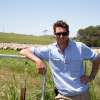
The benefits of planting trees at Chester Farm, Westwood
Posted 19 July 2023
Plantation planning Species, sites and planting On-farm benefits Economic benefits and markets Native regrowth forest management Tree Alliance
Biosecurity, increased lambing percentages, and a decrease in water evaporation are just some of the noticeable benefits of planting trees on Chester Farm.
Chester Farm located in Westwood (just a 15-minute drive southwest of Launceston) is run by Sam Archer and his Brother, Andrew.
The brothers run the 2,500-ha property and its cattle, ewes and irrigated cropping. Returning home after 9 years of working on different farms around South Australia, Western Australia and Victoria and studying Farm Business Management in Geelong, Sam returned to the farm to take over the production from his father. During his travels and work across Australia, Sam saw first-hand the clear advantages of having trees on farms and is now looking forward to benefiting from them himself.
Sam says he will be planting pines in the bigger areas at Chester, which includes rough sand banks that are uninhabitable for commercially viable crops. Sam says he sees this as an area for profit as well as an opportunity to improve the appearance of the farm.
“Planting the pines as fencing between paddocks and using the trees as shelterbelts will be beneficial for our stock and crops. We also want to use the trees as fencing around the perimeters of the farm for added biosecurity, especially along the roadside,” explains Sam.
Andrew is now running the livestock on the farm while Sam looks after the crops which includes poppies, peas, potatoes and onions. Sam notes the importance of protecting both the livestock and the crops on the farm and says that trees provide the perfect wind barriers.
Planting trees increases lambing percentages.

“We keep lambing percentages from each paddock, and have recorded a far better lambing percentage in the areas with trees, with a 10% increase in survival rate”, explains Sam.
“We see this project as being a win-win for us. We benefit from trees as they increase our lambing percentages, protect our cattle, irrigate our soils and provide shelter for our crops. We also hope to profit off the trees in the future and harvest them to sell as timber. So, the advantages of planting trees on the farm will benefit us in years to come as we can continue to replant and re-harvest when needed,” says Sam.
Sam is looking forward to seeing the impact that the additional pine trees will have on lowering the risks of bad weather on his stock, especially during lambing season. Lowering the chances of wind erosion on the topsoil and preventing further water evaporation from the damn are also added benefits of planting more trees at Chester.
“Wind erosion was bad last year. We have a large irrigation dam where we planted natives along waterways and areas that we don’t want to harvest. The trees provide wind protection, improved water quality and irrigation, and also prevent the topsoil running off.”
Pine trees – the answer to shelter needs
Sam says that pine trees are the ultimate choice of tree to plant on the farm, acknowledging their ability to grow in the sandier, dryer soils of Westwood.
“Pines are the perfect choice as they are hardy and good to use for fencing off the poorer areas of the farm that crops can’t grow on. They’re thicker and tougher and they also don’t get the blackberries and weeds growing around the trunks, so they require less maintenance”, explains Sam.
When asked about the future hopes for Chester, and what Sam hopes to achieve from participating in the Private Forests Tasmania demonstration site project, Sam acknowledges the importance of trees and their impact on achieving a sustainable future.
“I hope to spread the word on the benefits that trees can bring to farms. The advantages of having trees on farms not only help our farm to reduce it’s carbon footprint, but they also aid the longevity, productivity and success of Chester”.
Species: Pinus Radiata
Previous land use: Nitens plantation
Total area planted: 49.6ha
Seed source: STBA Level 7
Total seedling numbers: 70,116







